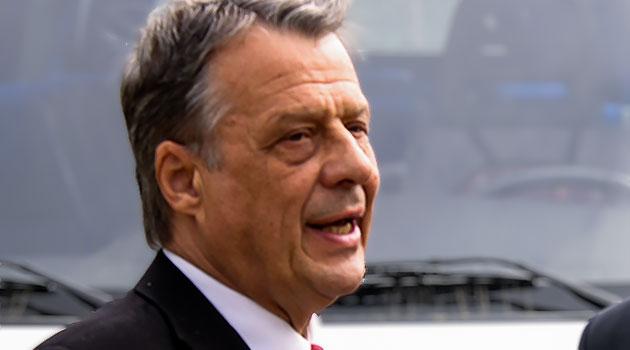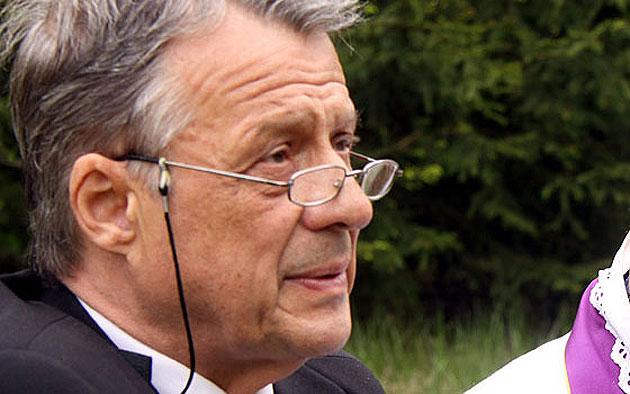Jarmila Balážová: Petr Uhl stood up for Romani people many times

Petr Uhl has passed away, the dissident and person who in my view actually “defined” human rights in the former Czechoslovakia and later in the Czech Republic in the most fundamental way – he believed in human rights, he fought for human rights, he did his best to assert them, he was willing to go to prison for them, and he did so twice, and for a long period of time. He was willing to make the sacrifice to his beliefs of being forced to work as a stoker; to hold long, quite often useless debates with the authorities; to stand up for the defenseless; to stand by his principles absolutely steadfastly; and on the other hand, to apologize when he knew it was the right thing to do.
One didn’t have to agree with all of his views to admire him for his bravery, courage and principles, ones that he stuck to fearlessly without backing down – who among us has that kind of conviction and can stand up to pressure, or has done so? Personally speaking, I very much dislike writing reminiscences of people in this vein whom you will never have a chance to meet in real life anymore, or whom you will only ever see in your own thoughts.
We have to do this, though, because there are people who simply deserve it even if they wouldn’t have cared about it one way or the other – it is necessary to thank them, to honor them once more, and to recall what they were like because the example of their lives and work simply deserves it. I will not describe all that Petr Uhl accomplished here or what is to his credit, you can read that elsewhere, after all.
Instead, I would like to relate my personal memory of him and then give some room for other people’s memories. I have asked several other Romani community members to write a few lines about him and you can read them below.
My own first encounter with Petr Uhl probably happened during the first half of the 1990s. I was a journalism student and he was a great figure with the aura of a brave, honorable guy.
By the way, his wife, Anička (Anna) Šabatová, about whom I am naturally thinking a great deal now, is just as brave and just as willing to risk a great deal and simply fight for her convictions and ideals. My path first crossed with that of Petr Uhl and resulted in our joint activity of a more distinct kind after the death of Tibor Danihel.
That was the 18-year-old Romani man from Písek who, on 24 September 1993, along with three other Romani community members, was chased out of the center of Písek by a big group of skinheads and into a river. While the others managed to get out of the water, Tibor Danihel was prevented from doing so by assailants wielding sticks, for a long time, systematically.
He was stuck there so long that he drowned in the cold water. It took almost six years for the Czech justice system to assess this intentionally-conducted attack as racially motivated murder, despite the fact that many of us did our best to see justice done back then.
For a long time, it was alleged that Tibor Danihel had drowned because he had been sniffing glue before being driven into the water. I filmed a reportage for Czech Television and also produced pieces for the radio about this incident, and among other things I joined together with other people, including Petr Uhl, in the interministerial group that was set up exactly for the purpose of investigating this case.
We had the opportunity to speak with eyewitnesses and police, to unravel other related matters and draw attention to them. There was nothing pretty about the context of what had happened.
That was my first opportunity to work with Petr Uhl over a longer period of time. Working in his home, we wrote up reports, compiled the details and made proposals, and I was astonished by how this man, who appeared so strict, and for whom I understandably had enormous respect, was able to take seriously the ideas of those of us who were basically still “newbies”.
He patiently explained things to me, listened to me, and took my efforts and involvement quite seriously. We met each other many times after that.
We would see each other at the Lety u Písku commemoration ceremonies, at demonstrations, at different remembrance events, and at the Office of the Government, where for me he was one of the two most credible Human Rights Commissioners this country has ever had because his belief in human rights was something he simply lived throughout his entire life. Sometimes Petr Uhl asked me whether I knew that one of his grandmothers had been Romani.
I think he even told me he declared himself to be of Romani nationality during the census. He was fundamentally opposed to the new law on Czech state citizenship after the country separated from Slovakia, legislation that was so absurdly formulated as to absolutely unnecessarily deprive thousands of Romani people of Czech citizenship who had lived in the Czech Republic their entire lives.
These people then had to request their Czech citizenship again through a complex process. Petr Uhl did not just draw attention to this issue – as a gesture of protest he, too, chose to become a citizen of Slovakia when the country split in two and then waged a lengthly court battle that he eventually won after years, which meant he could use dual citizenship.
He was very consistent and stubborn in his fight against that law and the official sham of it. He was famous for publicly advocating for the Roma, for being bothered by the policies towards them, for wanting to set up better human rights mechanisms, and for wanting to involve the Roma themselves in policies related to the Roma.
There’s a lot to remember, including that every time I voluntarily chose him as a guest for a radio show, I was frightened of using the wrong term for something. He really disliked it when people misspoke.
What I liked very much was how he supported his wife when she became the Public Defender of Rights. The last time I encountered him was on Náměstí Míru here in Prague.
He was using a wheelchair and had lost a great deal of weight. We said hello, chatted briefly, and I patted him on the shoulder and hand.
Petr, thanks for all of it… and there is so much to thank you for! Below is just a fraction of what has been written about you by the Romani people who also remember you, paĺikeras.
Ondřej Giňa, Sr.
Petr Uhl has passed away. I knew him to be a guy who was correct. He belongs among the figures such as Václav Havel, Václav Trojan, Jiří Dienstbier or Pavel Rychetský. Petr Uhl was a left-winger with a strong sense of justice, especially for social justice. That is why he couldn’t ignore the social and societal disadvantaging of Romani people, which rapidly deteriorated after the “Velvet Revolution”. He knew the Romani situation not just from official reports, but also from his personal meetings with Romani leaders.
From those personal experiences and findings, he judged that a possible way forward for improving the complex position of Romani people in this society would be our direct participation in solving our problems. Petr Uhl did not take a paternalistic approach toward Romani people. He simply perceived our problems as a social reality that has to be solved. His persistence, tirelessness and amazing diligence yielded results that give us certain opportunities to contribute to addressing our own affairs today.
Petr Uhl was behind the birth of the Interministerial Commission for Romani Affairs, he contributed to the birth of the Bratinka Report and other measures that could never have worked without his efforts. He lived a life that was not in vain. He stood on the side of those who needed his support, knowledge, conscience and strength. That is no small feat.
Edita Stejskalová
I am very sorry to hear that Petr Uhl has died. I had the opportunity to speak with him when I and others were assisting Anna Šabatová, his wife, with her campaign for the lower house. He was already ill by then, but despite that he greatly supported his wife’s candidacy and stood by her. He was aware that women belong in politics and are of value. Unlike other people, he never doubted the abilities of women. He was ahead of everybody else in that regard as well. He was courteous, gallant and quite charismatic.
There is no doubt that he is among the civil society activism figures whom I will always think of highly and whom I greatly appreciate.
Petr Uhl, Viktor Dobal, Ivan Martin Jirous and Martin Mejstřík are genuine figures of civil society activism here who have never been afraid to shout the truth and to stand up for it at any time. The attitude that one should not keep one’s mouth shut and fall in line when something really is “dirty pool” is close to my heart as well. I would like to express my sincere condolences to Petr Uhl’s family.
Barbora Bukovská, legal director of the international organization ARTICLE 19
I appreciated Petr Uhl immeasurably from the moment he took a principled position about the discriminatory law on Czech citizenship when the Czech Republic became independent. That legislation, which Havel unfortunately signed, deprived thousands of Romani people in the Czech Republic of their citizenship and frequently of their home and source of livelihood. Petr Uhl, as a gesture of protest, even chose Slovak citizenship and demonstrated the force of standing in solidarity with those who are the most disadvantaged in our society. He also supported me a great deal in my work on the issue of the forced sterilizations of Romani women. When we drew attention to that problem in January 2003, he immediately called me and supported me and continued to do so for many years afterward. I have a great deal to thank him for!
